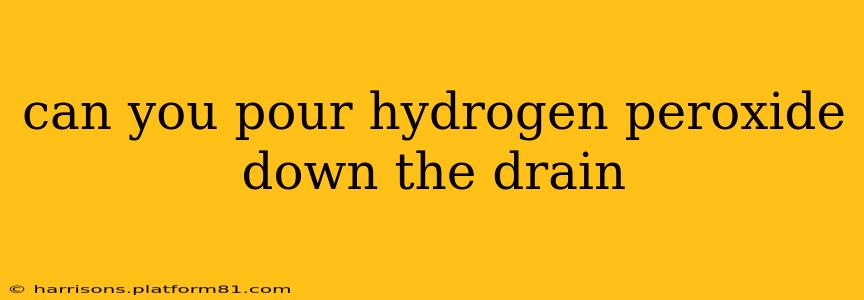Can You Pour Hydrogen Peroxide Down the Drain?
The short answer is: generally yes, but with some important caveats. Pouring small amounts of dilute hydrogen peroxide down the drain is usually harmless. However, larger quantities or higher concentrations can cause issues. Let's delve deeper into the specifics.
What Happens When You Pour Hydrogen Peroxide Down the Drain?
Hydrogen peroxide (H₂O₂) is a relatively unstable compound that naturally breaks down into water (H₂O) and oxygen (O₂). This decomposition is accelerated by exposure to light, heat, and certain catalysts. In your drainpipe, this breakdown process occurs, leaving behind mostly harmless water and oxygen. The oxygen released might even help to slightly oxidize and break down some organic material in your pipes, although this isn't a significant cleaning effect.
When Is It Okay to Pour Hydrogen Peroxide Down the Drain?
-
Small Amounts of Dilute Solutions: Pouring a few ounces of the typical 3% hydrogen peroxide solution you find in drugstores is generally acceptable. This low concentration decomposes quickly and poses minimal risk to your plumbing or the environment.
-
Occasional Use: Using hydrogen peroxide as a drain cleaner should not be a regular practice. It's better used for occasional spot cleaning or disinfection rather than as a replacement for proper drain maintenance.
When Should You NOT Pour Hydrogen Peroxide Down the Drain?
-
Large Quantities: Pouring significant amounts of hydrogen peroxide, especially concentrated solutions (higher than 3%), can damage your pipes. The exothermic reaction (heat-producing) during decomposition could potentially warp or melt certain types of pipes.
-
Septic Systems: Avoid pouring hydrogen peroxide down the drain if you have a septic system. While small amounts might not cause significant harm, larger quantities can disrupt the delicate balance of bacteria in your septic tank, leading to inefficiency.
-
Metal Pipes: While unlikely to cause immediate damage, repeated exposure to hydrogen peroxide could potentially corrode certain metal pipes over time.
What Are the Alternatives to Pouring Hydrogen Peroxide Down the Drain?
For cleaning drains, consider using baking soda and vinegar, a natural and effective solution. For more stubborn blockages, a drain snake or professional plumbing service may be necessary. Remember, preventative maintenance, such as regularly cleaning hair from your drains, can significantly reduce the frequency of clogs.
Is Hydrogen Peroxide Harmful to the Environment?
In the small quantities typically used in households, the diluted hydrogen peroxide decomposes before reaching water treatment plants. However, large amounts of concentrated hydrogen peroxide could have negative environmental effects. It's best to minimize its use and dispose of it responsibly.
Can Hydrogen Peroxide Damage My Pipes?
As mentioned above, while small amounts of dilute hydrogen peroxide are unlikely to cause immediate damage, larger quantities or concentrated solutions can potentially damage your pipes, particularly those made of certain plastics or metals. The heat generated during decomposition is the main concern.
How Can I Dispose of Large Amounts of Hydrogen Peroxide Safely?
For larger quantities of hydrogen peroxide, check your local waste disposal guidelines. Some areas may have specific instructions for hazardous waste disposal. You might be able to dilute the solution significantly before disposal to minimize any potential impact.
In conclusion, while small amounts of dilute hydrogen peroxide are generally safe to pour down the drain, it's crucial to be mindful of the quantity and concentration. For large amounts or concentrated solutions, alternative disposal methods should be explored to protect your plumbing and the environment. Remember, responsible waste disposal practices are crucial for maintaining a healthy household and environment.
